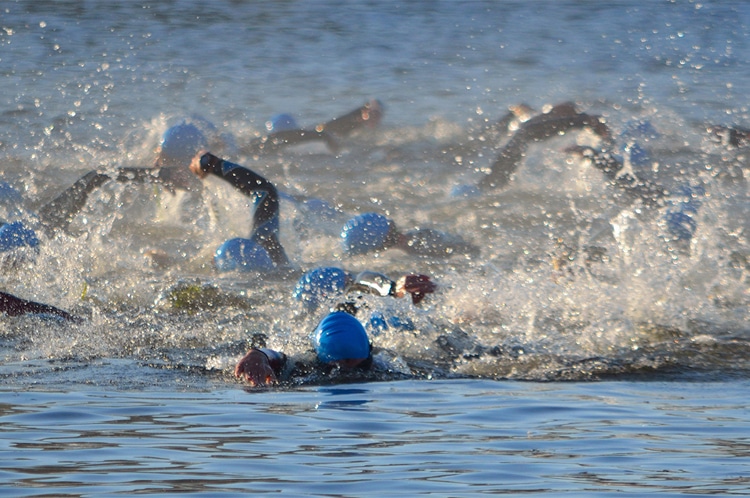The couch to triathlon plan is a training program designed to help individuals gradually build up endurance to compete in a triathlon. It is a beginner-friendly program that helps people with little to no experience improve their fitness and reach their goals.
The triathlon is a challenging multi-sport event that involves swimming, cycling, and running. It requires a high level of fitness and endurance, and can be daunting for individuals who are new to the sport. The couch to triathlon plan provides a structured approach to training that helps people prepare for the race by gradually increasing the intensity and duration of their workouts.
This plan is ideal for beginners who are looking to start a new fitness journey and want to achieve a challenging goal. With the right mindset and dedication, anyone can complete a triathlon, and the couch to triathlon plan is the perfect tool to help get started.

Credit: www.nomeatathlete.com
Developing A Training Plan
If you’re considering tackling a triathlon, having a structured and effective training plan is key to your success. Here are some important points to keep in mind when creating your triathlon training plan:
Discuss The Importance Of Setting Realistic Goals
Before you begin developing your training plan, it’s crucial to set realistic and achievable goals. Otherwise, you may get discouraged or become injured. Here are some tips for setting appropriate goals:
- Start with short-term goals, such as running a 5k or completing a sprint triathlon.
- Next, work towards intermediate goals, such as completing an olympic triathlon or a half-marathon.
- Finally, set long-term goals, such as completing a full ironman triathlon or running a full marathon.
Outline The Components Of A Triathlon Training Plan, Including Swimming, Cycling, And Running
Triathlete training plans include swimming, cycling, and running exercises. Here are some things to consider:
- Swimming: If you’re not a proficient swimmer, consider signing up for swim lessons to help improve your technique and endurance. As swimming is the first discipline in a triathlon, it’s important to work on your swim time, strength, and overall technique.
- Cycling: Cycling is the longest phase of a standard triathlon, so consider investing in proper equipment and training at the right pace and intensity through either power metrics or heart rate. Consider incorporating stair climbing or an indoor bike trainer into your workout routine.
- Running: Train regularly to improve your running agility and endurance. Mix in periods of ‘fartlek’ running; where you alternate between fast and slow-paced running, including hill climbs and descents during your exercises, as this helps with endurance and tempo changes.
Provide Tips For Structuring A Training Plan, Including Scheduling And Tracking Progress
Organization, consistency, and persistence are crucial when it comes to training yourself for success in triathlon. Here’s how you can structure an effective training plan:
- Plan your workouts ahead of time and stick to a consistent schedule.
- Include rest days to give your body time to recover.
- Tracking your progress helps you to monitor your improvements and helps you to see what works and what doesn’t.
Overall, a triathlon training plan that combines appropriate goal-setting, structured workouts that improve your stamina, quantitative tracking of your progress and adaptability to different terrains and situations is crucial to success.
Nutrition And Recovery Strategies
Discuss The Important Role Of Nutrition In Optimizing Triathlon Performance
A proper nutrition plan is key to optimizing your triathlon performance. Your meals should focus on fueling your body with the nutrients it needs, while also supporting your body’s recovery process. The right balance of carbohydrates, protein, and healthy fats can help provide you with the energy you need to complete your training sessions while also aiding in muscle recovery.
Outline Specific Dietary Recommendations For Triathletes
- Carbohydrates: Consuming carbohydrates is crucial for endurance athletes. They are a primary source of fuel for your body during high-intensity workouts and can help prevent fatigue. Aim to consume around 3-5 grams of carbohydrates per pound of body weight per day.
- Protein: Protein is important for muscle recovery and repair after tough workouts. As a triathlete, aim to consume around 0.6-0.8 grams of protein per pound of body weight per day. Good sources of protein include lean meats, fish, eggs, dairy products, and plant-based proteins like lentils and quinoa.
- Healthy fats: Healthy fats are a great source of energy and aid in hormone regulation. Focus on consuming monounsaturated and polyunsaturated fats, found in foods like nuts, seeds, avocados, and fatty fish like salmon.
Provide Recovery Strategies To Ensure Adequate Rest And Injury Prevention
Proper rest and recovery are just as important as training when it comes to preventing injury and maximizing performance. Here are some strategies to help you recover effectively:
- Sleep: Aim for 7-9 hours of good quality sleep every night. This helps your body recover and repair during the night, enhancing your overall performance and reducing the risk of injury.
- Foam rolling: Use a foam roller to release any tight muscles and improve blood flow to aid in recovery. Foam rolling can also help prevent injury and reduce muscle soreness.
- Active recovery: Easy low-intensity workouts like walking, cycling or swimming can help improve your blood flow and speed up recovery. Engage in such activities one or two days a week to reduce the risk of injury and keep your body active.
Finding Motivation And Support
Discuss The Challenges Of Staying Motivated When Training For A Triathlon
Training for a triathlon can be daunting. It’s not just about getting physically prepared; it’s also about staying motivated throughout the entire process. It can be exhausting, and many people give up before they even start. Here are some of the challenges you might face when trying to stay motivated when training for a triathlon:
- Overcoming mental hurdles
- Finding the time to train
- Sticking to your training regimen
- Keeping your focus on the long-term goal
Outline Different Strategies For Staying Motivated, Including Setting Up A Support System And Finding A Training Partner
Having a plan in place to help you stay motivated during your training is essential to achieving your goals. Here are some strategies to help you stay focused and committed:
- Create a support system: Whether it’s a friend, family member, or a coach, having someone to motivate you during your training is extremely important. They can help keep you accountable for your training schedule and provide you with support when you need it.
- Join a community: Joining a group or team of individuals who are also training for a triathlon can help you stay motivated. It can provide you with a sense of camaraderie and provide you with a support system that understands what you’re going through.
- Hire a coach: A coach can provide you with a personalized training plan that is tailored to your specific needs. They can also serve as a motivator, pushing you to achieve your goals and providing you with guidance whenever you need it.
- Find a training partner: Having a training partner can keep you motivated and provide you with accountability. It’s easier to stay committed to your training when you know someone else is counting on you.
Highlight The Importance Of Mental And Emotional Support When Training For A Triathlon
Training for a triathlon can be mentally and emotionally challenging. Here are some reasons why mental and emotional support is key to succeeding in your training:
- Mental and emotional support can help you overcome roadblocks in your training. A support system can provide you with the encouragement and motivation you need to keep going when you feel like giving up.
- A support system can also help you develop mental resilience. It’s not just about physical strength; it’s about having the mental fortitude to push through adversity and keep going, even when it’s tough.
- Mental and emotional support can also help you maintain a positive mindset. A positive mindset can help you stay motivated and focused on your goals, even during the most difficult parts of your training.
Training for a triathlon requires more than just physical preparation. It can be mentally and emotionally challenging, and staying motivated throughout the entire process can be difficult. However, there are strategies you can employ to help you stay focused and committed, including setting up a support system and finding a training partner.
Remember, mental and emotional support is just as important as physical support when training for a triathlon.
Frequently Asked Questions Of What Is The Couch To Triathlon Plan
What Is The Couch To Triathlon Plan?
The couch to triathlon plan is a training program that gradually prepares beginners to compete in a triathlon.
How Long Does It Take To Complete The Plan?
It typically takes around 12 weeks to complete the couch to triathlon plan, but the timeline can be adjusted based on individual needs and progress.
What Are Some Basic Requirements For The Plan?
To start the program, you should have a solid level of fitness and be able to swim at least 50 meters, cycle for 30 minutes, and run for 20 minutes.
How Does The Plan Progress Over Time?
The plan progresses gradually, increasing the duration and intensity of each workout as the weeks go on. By the end, participants should be able to complete a sprint triathlon!
Conclusion
The couch to triathlon plan is an effective program that allows beginners to participate in their first triathlon. With its gradual approach, it helps individuals build their endurance and train their muscles to withstand the stressful demands of the race.
This plan is an excellent way to improve health, fitness, and overall well-being. Participants usually enjoy their time training and feel accomplished at the end of the race. Completing a triathlon is not an easy task, but with the right mindset, dedication, and a well-structured training program like couch to triathlon, anything is possible.
It is essential to note that while the plan is designed for beginners, it is still challenging and requires commitment and discipline. However, the sense of achievement and the benefits of completing a triathlon make it all worth it. Overall, the couch to triathlon plan is an excellent way for beginners to step into triathlon with a well-defined, structured plan.
